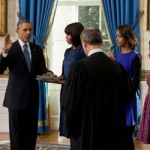
Barack Obama's second term will be as contentious as his first.
by Geoffrey Stevens
When Barack Obama takes the oath of office formally today, he may reflect on the reality that the job of being president is a good deal more complicated than it seemed in the euphoria of his first swearing-in four years ago.
Back then, he was a junior senator from Illinois who had propelled himself to the highest office in the land. "Who'd have thought that the war in Iraq would be the least of my worries?" he joked in a 60 Minutes interview that reviewed events in his first year, including the meltdown on Wall Street and a global recession. He made climate change a priority, but wasn’t able to do anything significant about it. He tried to inject a measure of fairness into the tax code, but had to settle for a minuscule increase in taxes on the super-wealthy.
He made health care reform his signature priority and he succeeded to a greater degree than his predecessors. Using every ounce of his political capital, he managed to persuade Congress to give him a half-loaf — an insurance plan that subsidizes poor and middle-class families but stops far short of a single-payer system, on the Canadian model. He had to fight to get Republicans in Congress to agree to prevent the United States from falling off the “fiscal cliff.”
The test of Obama’s will — and perhaps a measure of his presidency — will come on gun control.
Looking ahead, Obama knows he faces more of the same in his second term. There may not be another Hurricane Sandy or another massacre like the one at Sandy Hook Elementary School to test the nation’s will. But the Republicans will still be there in Congress, more determined than ever to thwart the president’s will. Ideology and partisanship will continue to dictate their politics.
The test of Obama’s will — and perhaps a measure of his presidency — will come on gun control. By all accounts he was genuinely devastated by the slaughter of 20 school children and six adults at Sandy Hook in Newtown, Connecticut, in December. He promised action, and last week he announced it: a ban on new assault weapons (but not on existing ones), limits on high-capacity magazines, more thorough background checks for purchasers of firearms, and tougher laws on trafficking of weapons across the country.
The Obama proposals, to be entrusted to Vice-President Joe Biden, amount to something less than a declaration of war on guns and gun violence — a good deal less. The new laws, if enacted, will do nothing to reduce the number of firearms in private ownership in the United States (currently 270 million, or 88.8 guns for every 100 Americans, women and children included). And they will do precious little to deter people who should never be trusted with a deadly weapon from acquiring one, legally or illegally.
“If enacted,” are key words. The attack ad aired by the National Rifle Association featuring Obama’s daughters was unconscionable, but it is a harbinger of the abuse the president can expect as the gun control debate moves into Congress.
The attack ad aired by the National Rifle Association featuring Obama’s daughters was unconscionable, but it is a harbinger of the abuse the president can expect as the gun control debate moves into Congress.
Although polls show a modest increase since Sandy Hook in public support for some form of gun control, the opponents are digging in against what they interpret as a socialist, even communist, crusade to confiscate their weapons. The rhetoric of the gun lobbyists, both in and outside Congress, reflects the growing intensity of their opposition.
On Saturday, a series of rallies was held in 49 states (all except Alaska) to mark an event called, if you can believe it, “Gun Appreciation Day.” Summoned by social media, crowds ranged from a few dozen to a few thousand people, some wearing holstered pistols.
In St Paul, Minnesota, 500 people cheered a local Republican legislator when he called for laws to allow teachers to carry guns in school and university students to pack guns on college campuses.
In Phoenix, Arizona, activist Eric Cashman, dressed as a 1776 Revolutionary War Minuteman, invoked the memory of the founding fathers: “Had they not had their firearms … to stand up against the British, we’d still be a British colony.”
Get real! How does a 21st century president talk sense to characters still living in the 18th century?
© Copyright 2013 Geoffrey Stevens, All rights Reserved. Written For: StraightGoods.ca
 Cambridge resident Geoffrey Stevens, an author and former Ottawa columnist and managing editor of the Globe and Mail, teaches political science at Wilfrid Laurier University and the University of Guelph. He welcomes comments at the address below. This article appeared in the Waterloo Region Record and the Guelph Mercury.
Cambridge resident Geoffrey Stevens, an author and former Ottawa columnist and managing editor of the Globe and Mail, teaches political science at Wilfrid Laurier University and the University of Guelph. He welcomes comments at the address below. This article appeared in the Waterloo Region Record and the Guelph Mercury.
Sorry, the comment form is closed at this time.